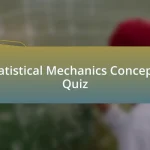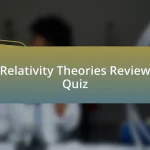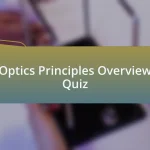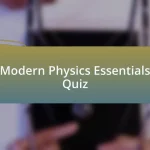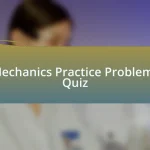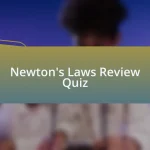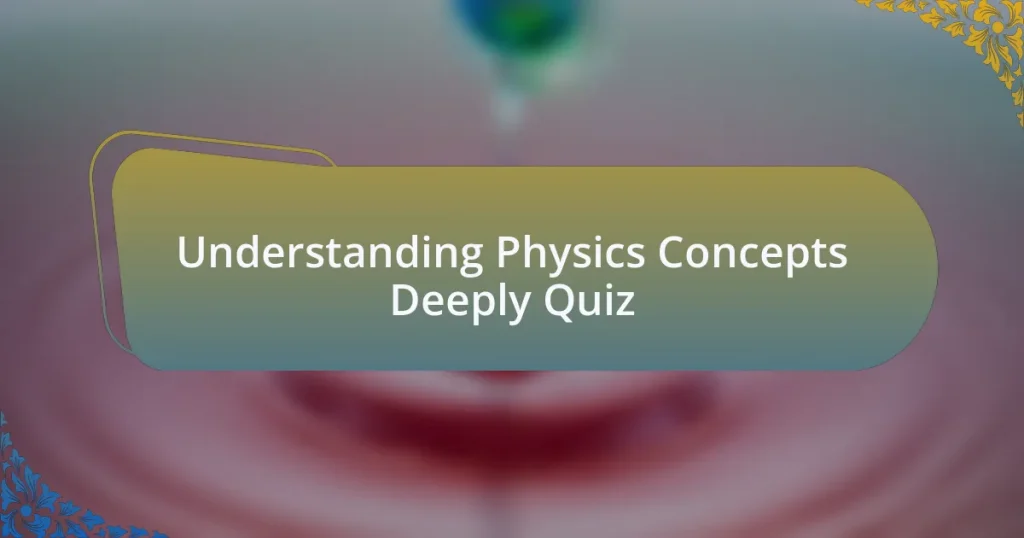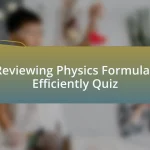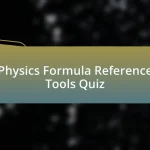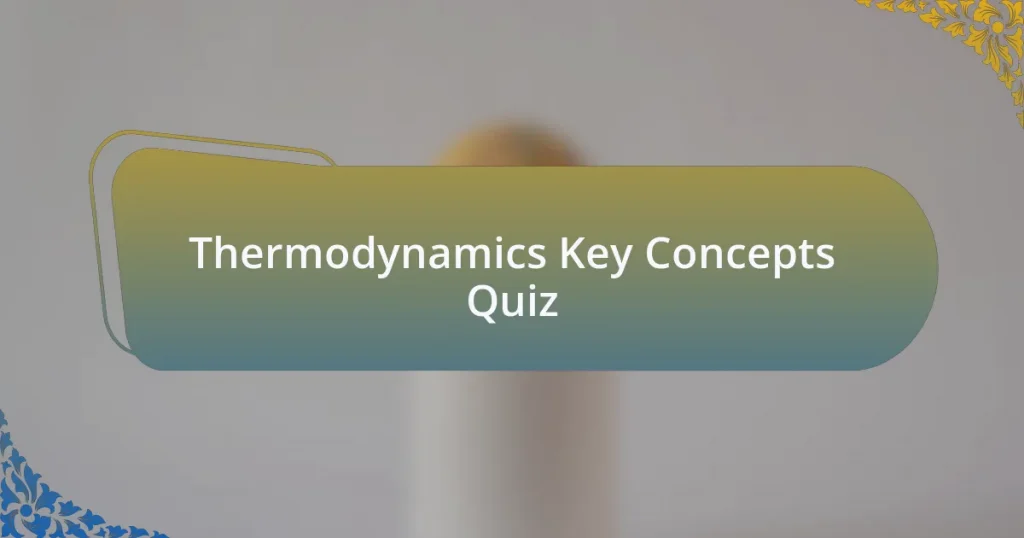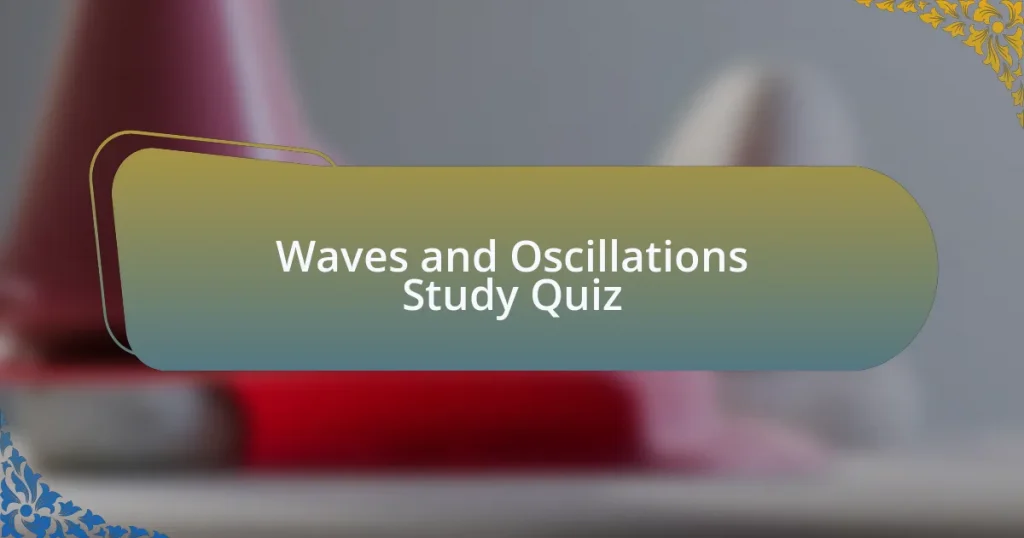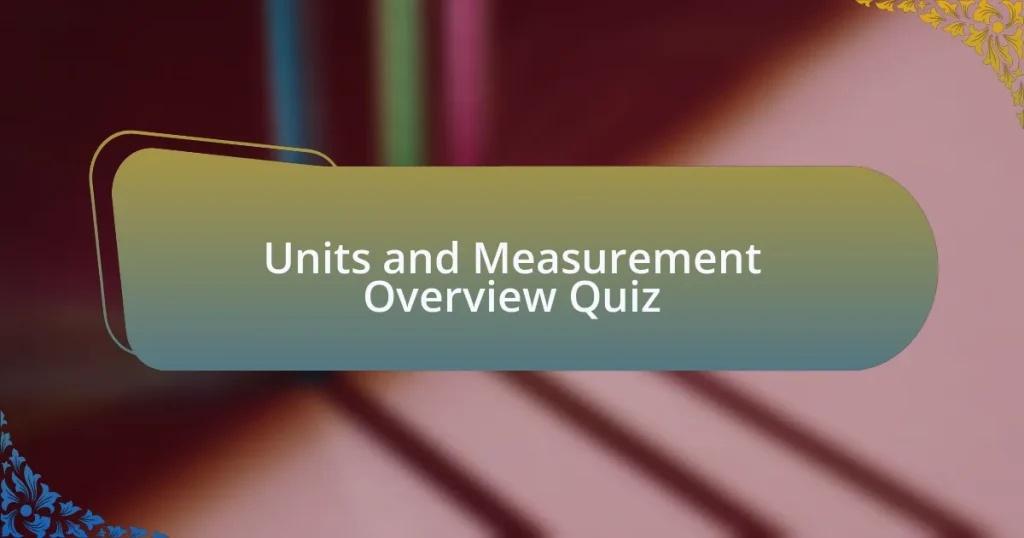Start of Understanding Physics Concepts Deeply Quiz
1. If a 5kg object experiences a force of 15N, what is its acceleration?
- 30 meters per second squared
- 7.5 meters per second squared
- 3 meters per second squared
- 12 meters per second squared
2. What is the formula for calculating gravitational potential energy?
- Gravitational potential energy = force × distance
- Gravitational potential energy = mass × gravitational acceleration × height
- Gravitational potential energy = mass ÷ height
- Gravitational potential energy = mass × velocity × time
3. What is the principle of superposition in wave theory?
- The principle states that when two or more waves overlap, the resultant displacement is the sum of their individual displacements.
- It states that waves can only travel through solid materials.
- It indicates that waves cannot interfere with each other.
- It describes how waves can amplify only in a vacuum.
4. What is the name of the effect that causes light to bend when it passes through different mediums?
- Diffraction
- Reflection
- Absorption
- Refraction
5. What is the unit of frequency in the International System of Units?
- Joule (J)
- Hertz (Hz)
- Newton (N)
- Pascal (Pa)
6. What physical law relates the pressure, volume, and temperature of an ideal gas?
- Pascal`s Principle
- Coulomb`s Law
- Ideal Gas Law
- Boyle`s Law
7. What term describes the ability of a system to do work?
- Force
- Power
- Energy
- Mass
8. What is the name of the force that opposes motion between two surfaces in contact?
- Magnetism
- Pressure
- Friction
- Tension
9. What is the law of conservation of energy?
- Energy can be created or destroyed
- Energy cannot exist in a vacuum
- Energy is always increasing in a system
- The total energy of an isolated system remains constant
10. In which direction does the magnetic field line move outside a magnet?
- From south to north
- From north to south
- From west to east
- From east to west
11. What is the relationship between force, mass, and acceleration as described by Newton’s second law?
- Force equals mass times acceleration (F = ma)
- Acceleration equals force divided by mass (a = F/m)
- Force equals mass plus acceleration (F = m + a)
- Mass equals force divided by acceleration (m = F/a)
12. What is the phenomenon of light spreading out after passing through a slit called?
- Reflection
- Diffraction
- Absorption
- Refraction
13. In what units is work measured in the International System of Units?
- Joules (J)
- Watts (W)
- Barometers (B)
- Newtons (N)
14. What is the phenomenon called when sound waves bend around an obstacle?
- Reflection
- Refraction
- Resonance
- Diffraction
15. What is the name of the principle stating that pressure decreases as the speed of a fluid increases?
- Pascal`s law
- Bernoulli`s principle
- Newton`s law
- Archimedes` principle
16. What device is used to display the spectrum of light?
- Calorimeter
- Spectrometer
- Telescope
- Microscope
17. What is the effect called when an object moves in circular motion?
- Linear momentum
- Circular inertia
- Radial acceleration
- Centripetal force
18. What is the term for the energy associated with the motion of particles in a substance?
- Magnetic energy
- Thermal energy
- Chemical energy
- Kinetic energy
19. What is Snell`s law?
- Snell`s law explains the motion of celestial bodies.
- Snell`s law describes the force of gravity on objects.
- Snell`s law defines the relationship between the angles of incidence and refraction.
- Snell`s law states that energy is conserved in a closed system.
20. What is the formula for calculating the kinetic energy of an object?
- Potential energy
- Thermal energy
- Chemical energy
- Kinetic energy
21. How does the wavelength of sound affect its pitch?
- Wavelength affects the volume, not the pitch.
- Wavelength has no effect on pitch at all.
- A higher wavelength results in a lower pitch.
- A lower wavelength results in a higher pitch.
22. What is the name of the energy transformation process in a battery?
- Electrochemical reaction
- Mechanical advantage
- Thermal conduction
- Light absorption
23. What is the name of the force exerted by a surface to support the weight of an object resting on it?
- Gravitational force
- Magnetic force
- Frictional force
- Normal force
24. What is the constant acceleration due to gravity on Earth?
- 15 meters per second squared
- 10 meters per second squared
- Approximately 9.81 meters per second squared
- 5 meters per second squared
25. What does the term `inertia` refer to in physics?
- The pull of gravity on an object
- The speed at which an object falls
- The amount of kinetic energy in a moving object
- The tendency of an object to resist changes in its state of motion
26. How is the electric potential difference quantified in an electric circuit?
- Volt (V)
- Joule (J)
- Ohm (Ω)
- Ampere (A)
27. What is the term for a wave that oscillates perpendicular to the direction of travel?
- Surface wave
- Longitudinal wave
- Transverse wave
- Standing wave
28. What is the principle behind the functioning of a seesaw?
- The principle of moments
- The principle of inertia
- The law of buoyancy
- The conservation of energy
29. What is the service called that studies the relationships of forces acting upon a body?
- Dynamics
- Statics
- Kinematics
- Mechanics
30. What is the condition called where an object moves at a constant speed in a straight line?
- Uniform motion
- Rotational motion
- Variable speed
- Accelerated motion
Quiz Completed Successfully!
Congratulations on completing the quiz on ‘Understanding Physics Concepts Deeply’! This exercise was not just a test of knowledge but also an opportunity to deepen your appreciation for the fascinating principles that govern our universe. You may have encountered topics such as the laws of motion, energy conservation, and the nature of waves. Each question was designed to challenge your thinking and reinforce your grasp of core physics concepts.
Throughout the quiz, you likely developed a clearer understanding of how these concepts interconnect. Physics is not just about formulas; it’s about seeing the world through a different lens. You may have discovered how fundamental ideas apply to everyday life. Whether it was predicting the motion of objects or grasping the principles of electricity, each question provided insight into the practical implications of physics.
We invite you to explore the next section on this page, dedicated to ‘Understanding Physics Concepts Deeply.’ Here, you will find additional resources that can enhance your knowledge further. Dive deeper into the topics covered in the quiz and strengthen your test preparation. Knowledge in physics opens doors not just academically, but in understanding the world around you. Happy learning!
Understanding Physics Concepts Deeply
Foundations of Physics: Key Principles and Theories
Understanding physics requires grasping its fundamental principles. These include concepts such as Newton’s laws of motion, the law of conservation of energy, and thermodynamics. Mastering these principles provides the groundwork for more complex theories. For example, Newton’s second law, F=ma, illustrates how force, mass, and acceleration interact. This simple equation serves as a basis for many physical systems, illustrating core relationships in mechanics.
Important Physics Topics for Test Preparation
When preparing for physics tests, focus on essential topics. These often include mechanics, electromagnetism, thermodynamics, and waves. Each topic encompasses critical subtopics that may appear in exams. For instance, mechanics covers kinematics, dynamics, and energy, while electromagnetism includes electric forces and fields. Understanding these areas thoroughly increases the likelihood of performing well on assessments.
Effective Study Techniques for Physics Mastery
To deeply understand physics concepts, employ effective study techniques. Active learning methods, such as problem-solving and teaching back concepts, foster retention. Using visual aids, like graphs and diagrams, helps in conceptualizing complex ideas. Practice with past exam questions hones application skills and aids in identifying areas of weakness. These techniques ensure a comprehensive grasp of the material.
Common Misconceptions in Physics Understanding
Misconceptions can hinder physics comprehension. Common errors include confusing mass with weight or misunderstanding how forces interact. For instance, many students believe heavier objects fall faster than lighter ones, which is incorrect. Recognizing and addressing these misconceptions is crucial. By focusing on conceptual clarity, students can improve their performance on tests and deepen their overall understanding.
Utilizing Resources for Deeper Understanding
Various resources enhance the understanding of physics concepts. Textbooks often provide thorough explanations and practice problems. Online platforms offer interactive simulations and tutorials that cater to different learning styles. Engaging with study groups allows for collaborative learning and exchange of ideas. These resources complement traditional study methods, facilitating a deeper understanding of complex topics.
What is the importance of understanding physics concepts deeply for test preparation?
Understanding physics concepts deeply is crucial for effective test preparation. It enables students to apply fundamental principles to solve complex problems. A strong grasp of concepts allows for better retention of information and aids in critical thinking during exams. Research shows that students who comprehend the underlying principles perform better on standardized tests, typically scoring higher in both conceptual questions and problem-solving tasks.
How can students enhance their understanding of physics concepts?
Students can enhance their understanding of physics concepts through active learning methods like problem-solving, group discussions, and practical experiments. Engaging with the material rather than passively reading promotes deeper comprehension. Studies indicate that frequent practice and teaching others also reinforce knowledge, leading to improved performance on exams.
Where can students find resources to deepen their physics understanding for tests?
Students can find resources to deepen their physics understanding in several places: textbooks, online courses (like Khan Academy or Coursera), educational videos on platforms like YouTube, and dedicated physics forums. Access to these resources provides diverse perspectives and explanations of concepts, facilitating a more profound understanding as well as test preparedness.
When should students start preparing to understand physics concepts deeply?
Students should start preparing to understand physics concepts deeply at least several months before their exams. This timeline allows for thorough review and mastery of material. According to educational psychologists, spaced learning over time is more effective than cramming, leading to better retention and comprehension of complex physics concepts.
Who can assist students in deepening their understanding of physics concepts for tests?
Teachers, tutors, and study groups can assist students in deepening their understanding of physics concepts. Professional tutors can provide personalized guidance, while teachers often offer insights during office hours. Research shows that peer discussions in study groups can clarify difficult topics and enhance individual understanding, significantly impacting test readiness.



